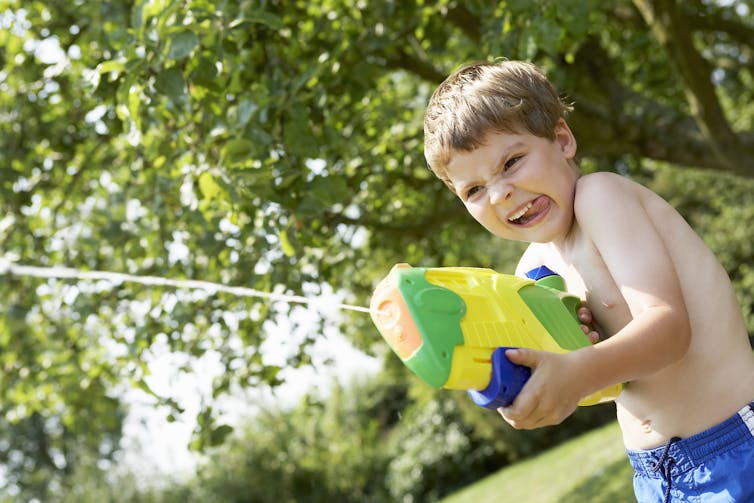Curious Kids is a series for children of all ages. If you have a question you’d like an expert to answer, send it to [email protected].
Why don’t parents like their kids to play with fake guns? – Henry, age 11, Somerville, Massachusetts
A major reason parents don’t like kids to play with pretend guns is they’re afraid you’ll get hurt.
It can be hard for others to tell if a gun is real or just a toy. While you and your friends might be able to tell it’s a harmless game, others won’t be so sure. Someone could mistake your toy gun for a real gun, see you as a threat and try to defend themselves, hurting you in the process.
Hundreds of children die because of gun violence each year in the United States. Because of these numbers, people like us – a pediatrician who has worked on firearm violence for 40 years and a firearm injury prevention researcher – are very concerned about firearms that are not stored properly and the injuries they can cause.
Some of the toy guns available for kids and parents to buy look very much like real guns, including pistols and rifles. Because these toys look so real, kids who come across a real gun may not realize it’s dangerous and not a toy. They may pick it up, fiddle around with it, point it at a friend or themselves and pull the trigger. More than 100 children are killed each year in the U.S. because they or a friend were handling a gun that unintentionally went off.

moodboard/Image Source via Getty Images
Violent games encourage violence
Playing with toy guns can also affect the way you interact with the world and think about how to solve problems. Researchers have found that just seeing weapons can make people act more aggressively – this is called the weapons effect, and it applies to toy guns. After watching a movie that contains a lot of gun violence, kids tend to be more interested in playing with guns, too. These are reasons parents may want to limit kids’ exposure to movies and TV shows that feature guns and prefer for kids to play with nonweapon toys.
Playing games that involve violence can make you more comfortable with violence and aggression. Kids can even become more violent themselves. Researchers have found that kids who play a lot of violent video games tend to show more signs of aggression than those who don’t play them.
We worry that kids who play a lot of shooting video games and with toy guns will believe that settling arguments with violence and guns is the right thing to do, when there are more constructive ways to resolve disputes.
Real guns are not toys
Adults who have firearms at home have a responsibility to keep them locked up and to prevent anyone from inappropriately accessing and using them. But some people who have firearms don’t lock them up. Or they keep them loaded with ammunition, which is very unsafe. It is always best to treat a gun as if it is real and loaded.
What should kids do if they find a firearm in their home or at a friend’s? The answer is very simple: Do not touch it. Leave it alone and tell an adult – even if you think it may be a toy. Checking it out yourself may cause the gun to go off accidentally and hurt someone if it turns out to be real.
The same is true at school. If you find a gun or hear classmates talking about a firearm, tell a teacher. Even if you worry your friends will get mad, telling a teacher could help prevent a serious or even deadly injury.
Parents who are responsible gun owners will teach their children about gun safety and how to handle and shoot them safely. But if you’re a school-age kid, you should never handle a gun by yourself.
Playing with or handling guns – real or fake – is dangerous and can be deadly.
Hello, curious kids! Do you have a question you’d like an expert to answer? Ask an adult to send your question to [email protected]. Please tell us your name, age and the city where you live.
And since curiosity has no age limit – adults, let us know what you’re wondering, too. We won’t be able to answer every question, but we will do our best.



